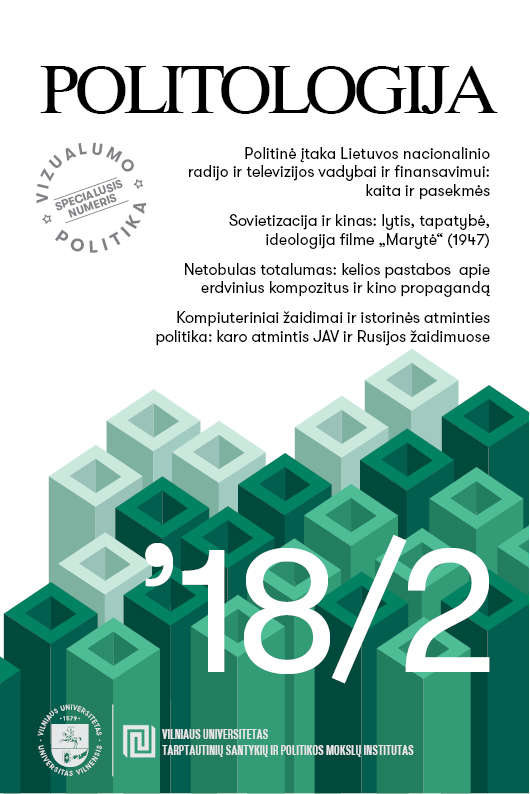SOVIETIZACIJA IR KINAS: LYTIS, TAPATYBĖ, IDEOLOGIJA FILME „MARYTĖ“ (1947)
SOVIETIZATION AND CINEMA: GENDER, IDENTITY AND IDEOLOGY IN THE FILM MARYTĖ (1947)
Author(s): Violeta Davoliute, Lina Kaminskaitė-JančorienėSubject(s): Cultural history, Gender history, WW II and following years (1940 - 1949), History of Communism, Film / Cinema / Cinematography
Published by: Vilniaus universiteto leidykla & VU Tarptautinių santykių ir politikos mokslų institutas
Summary/Abstract: This article analyzes post-war Sovietization through the prism of the first feature film made in Soviet Lithuania – Marytė – directed by Vera Strojeva and released in 1947, revealing the intention, process and outcome of propaganda in the newly occupied society under Stalinism. As the culture of cinema was part of a broader ideological endeavor, the analysis of this film helps to understand developments across the new Soviet western borderlands. This article reconstructs the context of the narrative of the film, its creation, dissemination and evaluation. The central character of the film is a Soviet Lithuanian war hero – a young female partisan captured and shot in the area of her native Zarasai. The authors analyze the construction of this protagonist in the film following the classical Soviet archetype of the young female “war saint”, similar to the Russian Zoya Kosmodemjanskaja. The choice of a female protagonist for the promotion of the “new Soviet subject” in the recently occupied territory is significant and may be interpreted as a deliberate attempt for encouraging a more sympathetic identification with the Soviet interpretation of history – especially in a country where an anti-Soviet partisan struggle was still taking place. The authors also demonstrate how well-established national and cultural metaphors and narratives were used in constructing a new ideology, considering the focus of this movie on the local level, the cinematic difficulties encountered and the critical reviews. The study employs interdisciplinary methodological tools that demonstrate the benefits of the cultural analysis of text and context.
Journal: Politologija
- Issue Year: 2018
- Issue No: 2 (90)
- Page Range: 34-64
- Page Count: 31
- Language: Lithuanian

